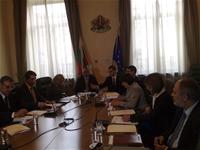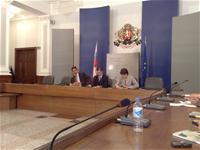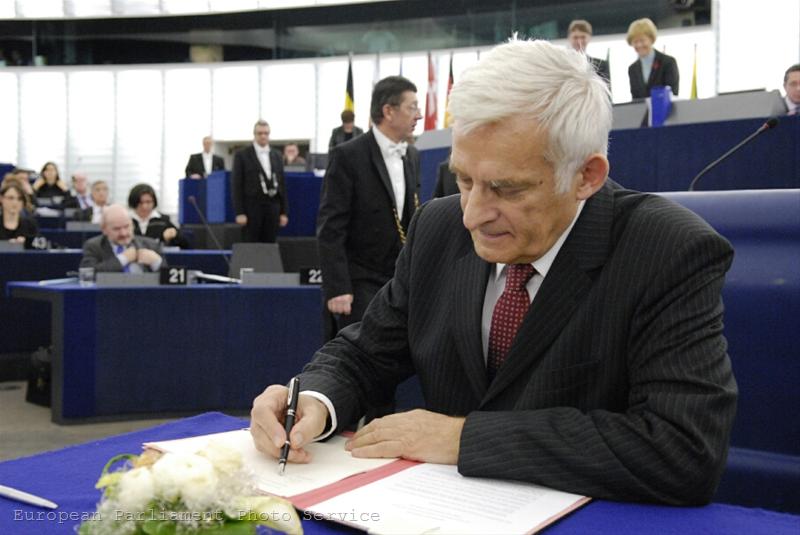The government is going to Brussels fully prepared
Adelina Marini, September 8, 2009
 The high level Bulgarian delegation that will visit Brussels on the 9th of September, led by the prime minister Boyko Borisov will present a concrete action plan and a mechanism for control of EU funds. Beside this the delegation, in which all ministers that manage operational programmes will take part, will provide the Commission with concrete projects and will ask for an extension of the term of the pre-accession programme ISPA with 1 more year.
The high level Bulgarian delegation that will visit Brussels on the 9th of September, led by the prime minister Boyko Borisov will present a concrete action plan and a mechanism for control of EU funds. Beside this the delegation, in which all ministers that manage operational programmes will take part, will provide the Commission with concrete projects and will ask for an extension of the term of the pre-accession programme ISPA with 1 more year.
One of the key issues with which the delegation will try to convince Brussels that Bulgaria still deserves a credit of confidence regarding the capacity of the country to tackle corruption and capability of EU funds absorption will be the conflict of interests. According to the secretary of the newly formed EU Funds Management Council Ms. Yuliana Nikolova, the government will do everything possible to avoid any political interference in the management of EU projects. Yesterday was the first session of the Council, led by the prime minister.
One of the basic elements of conflict of interest prevention is the creation of a blacklist of  suspicious projects - something that the previous government also tried to do, unsuccessfully. "At the moment we are discussing the legal framework of when we can make checks on such projects and how we can do them. There is no legal procedure to allow this unless there is a court ruling. We cannot eliminate contractors for whom we have suspicions to have made any violations of the rules but there are no administrative obstacles to find an institutional mechanism those projects to be checked", Ms Yuliana Nikolova explained.
suspicious projects - something that the previous government also tried to do, unsuccessfully. "At the moment we are discussing the legal framework of when we can make checks on such projects and how we can do them. There is no legal procedure to allow this unless there is a court ruling. We cannot eliminate contractors for whom we have suspicions to have made any violations of the rules but there are no administrative obstacles to find an institutional mechanism those projects to be checked", Ms Yuliana Nikolova explained.
Another serious measure aimed at improving the absorption and transparency is to keep all specialists on EU funds not to flow toward the private sector. Asked by euinside how can this be realised since the main argument for people fleeing the administration, Ms. Nikolova pointed out that the main motive for people fleeing the administration is not the payment. "The motivation of the officials should be the evaluation of their expertise, the lack of political interference in their work, because in many of the cases people leave because they don't know when they can make a decision, what decision they can take and whether, if it is an expert decision they might not be punished afterwords". Besides, the government plans to release the burden from those officials that work with EU funds because there are many people, leaving work because of overload.
The minister of regional development Rosen Plevneliev announced, in the meantime, that he is going to Brussels with concrete projects on every programme and for the pre-accession programme ISPA he intends to ask the Commission to extend the term with 1 year. For the purpose the Ministry of Foreign Affairs is already holding consultations with several EU member states that have similar problems with this programme so as to gather support for the prolongation. He did not specify which countries are those but mentioned Poland. Beside this, Mr. Plevneliev said that he intends to secure more projects to be proposed, notwithstanding the financial situation of Bulgaria.
Asked by euinside is this possible given the bad perspectives for this year's budget and for the financial situation next year, the deputy prime minister and minister of finance Simeon Dyankov said: "If additional financing is necessary on behalf of the state, I expect that from the middle of next year and certainly in 2011 we will have a much better and favourable budget. But here we're talking about more projects because, actually, much more projects need to be proposed than we have money so that there is an opportunity if a project starts lagging behind, another one to replace it".
 In the meantime, it was announced that the Commission has decided to unblock another 19 mn euro on the pre-accession agriculture programme SAPARD after discussions between the agriculture commissioner Mariann Fischer Boel and the Bulgarian minister of agriculture Miroslav Naydenov. Thus, from the 140 mn euro blocked so far, only 68 mn remain frozen. According to Yuliana Nikolova the money for all good projects will be unblocked.
In the meantime, it was announced that the Commission has decided to unblock another 19 mn euro on the pre-accession agriculture programme SAPARD after discussions between the agriculture commissioner Mariann Fischer Boel and the Bulgarian minister of agriculture Miroslav Naydenov. Thus, from the 140 mn euro blocked so far, only 68 mn remain frozen. According to Yuliana Nikolova the money for all good projects will be unblocked.
Another measure of the government for guaranteeing transparent EU funds absorption will be the assignment of project managers for all projects which, generally, is a requirement for most projects. It was not clear why there hasn't been such a position so far. The government guarantees the continuity of the work on the operational programmes and for that reason there will be no significant changes in the managing bodies. There will be no political appointments either.
Later for euinside, the deputy foreign minister Krasimir Kostov, who chairs the Council for European Affairs at the government, explained that the government has a very hard task not only to regain the confidence of Brussels but also to activate all mechanisms in a way to guarantee full EU funds absorption. The speed is required by the fact that in 2010 there will be a review of the financial perspectives of the Union for the period 2007-2013 and if a country is performing badly the money for it will be transferred to a state that is doing much better. The money, planned for Bulgaria for the whole 7-year period is 6.8 bn euro.
According to Mr. Kostov, if Bulgaria fails this will put the country in quite disadvantageous position when the negotiations for the next financial perspectives (2014-2020) start.
 | © European Parliament Photo Service
| © European Parliament Photo Service | © Audiovisual Service
| © Audiovisual Service